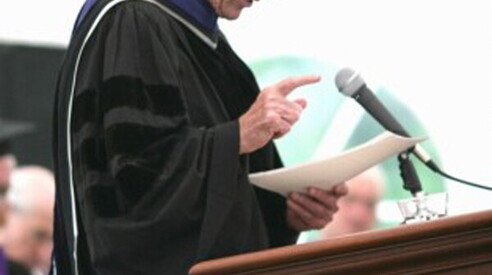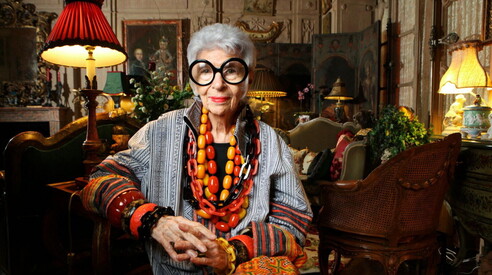
Father James Schall S.J.
How the Capitalism can save the Poor
One of the words Pope Francis probably will use in the U. S. will be ‘poverty’. He often relates this word to a great critic of capitalism. Is it correct, in your opinion, to propose this correlation?”
“Pope Francis often asks people to tell him what they think is true, not what they think that he wants to hear. Otherwise, he cannot learn anything new. This is a fine quality. The most famous book in the history of economics was called “The Wealth of Nations” not “The Poverty of Nations.” In the beginning everyone was poor. The problem was not to explain why the poor were poor but why anyone at all was not poor. Generally speaking, the reason why anyone is not poor is because of capitalism understood as innovation, growth, profits, distribution, and productivity.
The Holy Father’s use of the term ‘capitalism’ usually strikes most Americans as an equivocal usage of the word in which something is being described of which we have little knowledge. The fact is that the percentage of poor in the world has steadily decreased in recent decades. This is too seldom acknowledged or explained. What prevents dealing with the remaining poor is usually not capitalism in any form but political or religious ideas and corruptions that work contrary to poverty alleviation.
The principal impediment to helping the poor is too often the policies of modern state itself, especially varieties of open or covert socialism. Catholic social thought has but rarely recognized that governments themselves, with their own kind of greed, are primary obstacles to helping the poor help themselves. Latin American economic ideas often seem to be a heritage of the mercantilism of the colonial period, more of a state monopoly capitalism than anything we recognize by that name. No one denies that abuses exist. We deal with the abuses to let the system do what it can best do.”
Do you think the Pope’s ‘apocalyptic narrative’ will be understood by American society?
You mean by ‘apocalyptic narrative’, presumably, what the Holy Father says about ecology? He describes a this-worldly narrative of disasters caused by ‘earth warming’. I would suspect that practically all the ‘facts’ on which this thesis are said to be based are challengeable on scientific and practical grounds. Any problems are mostly explained in terms of natural cycles and conditions in the Sun and the planet. The records of recurrent “ice ages” and “milder ages” seem to be as old as the earth itself. The percentage of any problem caused by human activity seems relatively small and can be dealt with in terms of our knowledge and technology. Some warming even seems beneficial.
If you mean, on the other hand, ‘apocalyptic narrative’ in the sense of the Pope’s oft-repeated reference to Robert Hugh Benson’s The Lord of the World, which really does depict ‘end times’, I suppose we have always to recall St. Paul’s ‘We know not the day or the hour.’ Still, it does seem that we have now managed to overturn most of the basic principles of natural law in our public policies so that the modern state and culture often stand for just the opposite of what classic teaching has indicated. I think it is a duty of a pope to warn a world that is being formed against the explicit teachings of reason and the Gospel. All of this latter has little or nothing to do with ecology but everything with how we choose to life in whatever society we live.
The Catholic Church seems to emphasize that the poor are poor because the rich are rich. The rich are depicted as ‘great sinners’? Why?
St. Augustine used to say that both the rich and the poor can sin or be virtuous. The rich man does not have to become poor to be virtuous, nor does the poor man have to become rich to be virtuous. Aristotle said that most people need a certain sufficiency of goods to be virtuous. This is what true economic growth tries to achieve. Francis himself mentions rich friends of his who are good and generous men. Almost everyone recognizes that greed is a vice, though probably not as destructive as envy in the long run.
Aristotle also discussed this issue in terms of the virtues of justice and moderation. A rich man is not necessarily unjust because he is rich, nor is a poor man virtuous just simply because he is poor. Each can save or lose his soul in his present condition. Aristotle suggested that a wealthy man could do three things with his wealth. He discussed this in terms of truth, good, and beauty. He could establish a library, or a hospital, or an art museum. Thereby, he would return to the common good what he possessed. States which confiscate all wealth prevent such free activities to go on. The record of much voluntary philanthropy and charity confirms this view. Even when we read the Bible, we have to wonder where the rich of that period acquired their wealth. We know where the poor came from. The wealthy didn’t just steal it all. Was it always or necessarily acquired from exploitation? Take the parable of the talents. The man who has ten talents, because of his investment, acquires another ten. He is praised for it. It is the man who does nothing with what he has been given who is chastised. Capitalism, at its best, is a system that universalizes these basic principles.
Scripture is not a textbook in economics. God did not reveal to us everything we need to prosper, only a couple of things that we could not figure out by ourselves. He gave us brains, hands, and time. He left us the responsibility of figuring out how we could provide for ourselves. If He gave us everything, why bother about creating us in the first place? The discovery of how not to be poor on a worldwide basis is a discovery of modern times, but so is the state’s discovery of a method to control all of human life. Indeed, most of the totalitarian movements of modern times were and are presented as ways to help the poor. The poor become subjects of ideological manipulation and self-justification. But I think that the rich, the poor, and all in-between need each other. Just as the poor “will always be with us” so will the rich and in-between. What they all need is growth. They also, more fundamentally, need a sense of virtue and mutual responsibility. When these latter are lacking, the rich and poor, as Plato also said, will see themselves as antagonistic to each other."
In your last book, On Christians & Poverty, you write that poverty is something to be removed by the poor themselves. The argument seems to me to be revolutionary. In the recent Magisterium, we hear the opposite—the rich have to help the poor. What do you think?
The notion that the poor should remove their poverty by themselves is simply another way of stating the famous principle of subsidiarity, namely, that what can be done at the lowest level should be done there.
I look on this issue in this way:
1) We want people to be not poor.
2) We want them to make their way in the world by their own enterprise.
3) Often, the poor do not know how not to be poor.
4) More often, their governments do not know how either.
5) The poor can only learn how not to be poor from those who have learned how not to be poor.
6) No one will become not poor unless he has an incentive to do so.
7) The difference between successful and unsuccessful nations in the matter of poverty alleviation is measured by the degree to which they have learned how freedom, property, market, enterprise, rule of law, and virtue belong together.
The notion that wealth is a service means that the ways to be not poor, which most people desire and can learn, are made available through education, example, and, yes, by the competition found in market mechanisms. One of the great contributions of capitalism was the notion that a failed business did not condemn the owner to slavery, as is implied in some of the Gospel parables.
What works and what does not work are still issues. What works should be rewarded; what does not work should cease. The government should not be involved in keeping in business by taxes those enterprises that do not work. Those who need help should be given help by those who know how to help. No one wants a doctor to help him if the doctor does not know what is wrong with him. The whole point of a free market is to allow the poor not to be poor by themselves, by their own enterprise.
The trouble is, too often, that many want the poor to be poor and remain poor so that their own theories or projects can be justified in the name of helping the poor. The last thing the poor need is advice from someone, including the government and religion, who does not know how to help them. This is the danger that many good people fall into when thinking about the poor.”
Another issue in your book is that inequality is not injustice. Can you explain this in a few words?
It is closer to the truth to say that “equality is injustice” than to say that “inequality is injustice.” When God created the hierarchy of angels, he created each differently. It was not an injustice to the cow that it is not a horse or an angel. This is all in Aquinas. If everything is equal, then no distinction can be found in things.
The whole meaning of a ‘common good’ is that a wide variety of different goods exists, some more important than others. But all are needed in order that the greatest good, the whole, be achieved. The eye does not want the foot to be an eye. It wants it to be a foot. The variety of talent, virtue, energy, and intelligence is a good, not a bad thing. If we try to make everything “equal”, if, for instance, we give every student the same grade no matter what his performance, we simply destroy any standard of better and worse. Most efforts to improve would cease. If someone runs a hundred meter dash faster than I do, I am not being treated unjustly, but justly. It would be unjust for me to claim to be his equal in this matter.
This same thing is true in the economic and political world. We need and want a variety of different capacities and talents that are brought together not to make everyone equal but to allow us to specialize and do what we could not otherwise have done. If I am so equal that I must do everything by myself, I end up by living in a primitive way as I can only do a few things by myself. Inequality is unjust only when it does not deny the truth of real differences among us that need to be what they are in order to be at all. These differences are so designed that we have a variety and abundance in which everyone can participate through exchange, markets, or generosity. Basically, this is what Aristotle’s treatment of commutative and distributive justice was about.”


Il Foglio sportivo - in corpore sano
Fare esercizio fisico va bene, ma non allenatevi troppo




